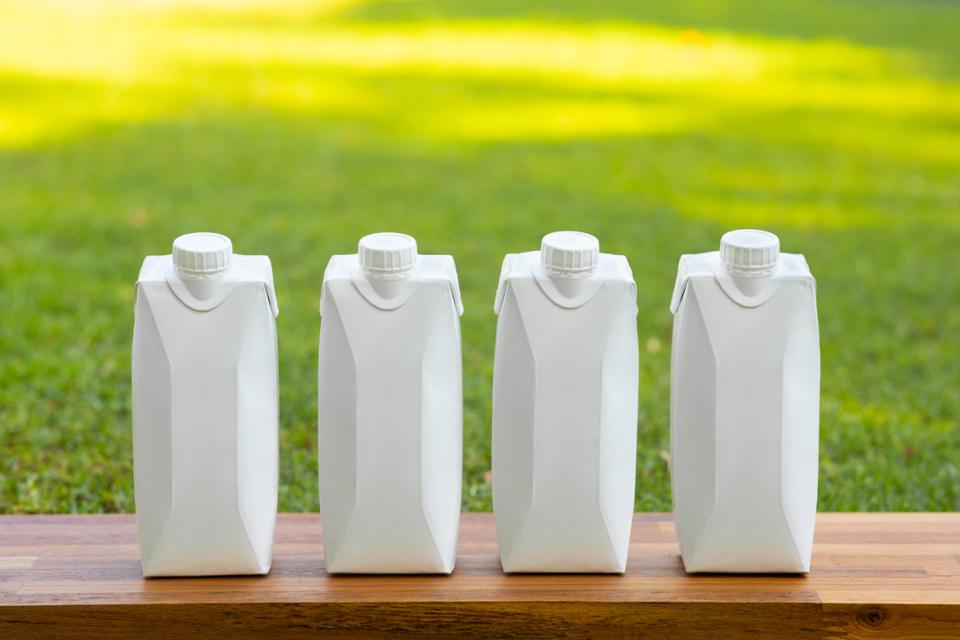The combination of milk processed at an ultra-high temperature (140 °C for four seconds) and sterilized packaging produces ultra-high-temperature or UHT pasteurized milk. This sterilization process destroys all microorganisms and their spores that could potentially be present in milk.1
To make UHT milk, milk is pasteurized at an ultra-high temperature and then packaged in a pathogen-free environment into sterilized containers, which are then sealed so that the milk can be stored at room temperature for up to three months or by the best before date.1-3 Once opened, UHT milk should be stored in the refrigerator and consumed within the next few days, like milk that has undergone regular pasteurization.1 Compared to UHT processing, regular pasteurization requires a lower temperature but more time, e.g., 63 °C for 30 minutes or 72 °C for 15 seconds.4,5
In practice
- Before opening, UHT milk can be stored at room temperature.1,2
- UHT milk has a longer shelf life than milk that has undergone regular pasteurization.1,2
- Ultra-high-temperature pasteurization has little effect on the nutritional value of milk due to the speed of the pasteurization process.2,3
The nutritional value of UHT milk
Ultra-high-temperature pasteurization has little effect on the nutritional value of milk or its flavour due to the speed of the pasteurization process.2,3 Whey protein, particularly β-lactoglobulin, is partially denatured during heating. However, denaturing the whey protein does not affect the nutritional value of milk.6,7 The evidence shows that approximately 70% of these proteins are denatured during ultra-high-temperature pasteurization;6 however, this percentage varies considerably between studies.8 UHT processing can also affect the availability of lysine (an amino acid), reducing it by 3.0% to 6.5%, which is considered to be negligible.9 The available evidence also shows that UHT milk has no impact on the risk of cardiovascular disease or on body weight.10
References
- Brown AC. Understanding Food: Principles and Preparation, 5th edition, Cengage Learning, 2015, Chapter 10, Milk, p. 216-217.
- Gedam K et al. The study on UHT processing of milk: a versatile option for rural sector. World J Dairy Food Sci 2007;2:49-53.
- Marangoni F et al. Cow’s milk consumption and health: a health professional’s guide. J Am Coll Nutr 2019;38:197-208.
- Vuillemard JC et al. Science et technologie du lait, 3e édition, Les Presses de l’Université Laval, 2018, chapitre 4, Les laits de consommation, p. 181 and 195.
- Canadian Food Inspection Agency. Dairy processing: High temperature short time (HTST) pasteurization systems. Requirements for the Safe Food for Canadians Regulations. www.inspection.canada.ca. Accessed September 13, 2021.
- Rolls BA and Porter JW. Some effects of processing and storage on the nutritive value of milk and milk products. Proc Nutr Soc 1973;32:9-15.
- Douglas FW et al. Effects of ultra-high-temperature pasteurization on milk proteins. J Agric Food Chem 1981;29:11-15.
- Sakkas L et al. Assessment of heat treatment of various types of milk. Food Chem 2014;159:293-301.
- Borad SG et al. Effect of processing on nutritive values of milk protein. Crit Rev Food Sci Nutr 2017;57:3690-3702.
- Hansen CK et al. The effect of UHT-processed dairy milk on cardio-metabolic risk factors. Eur J Clin Nutr 2017;71:1463-1466.


